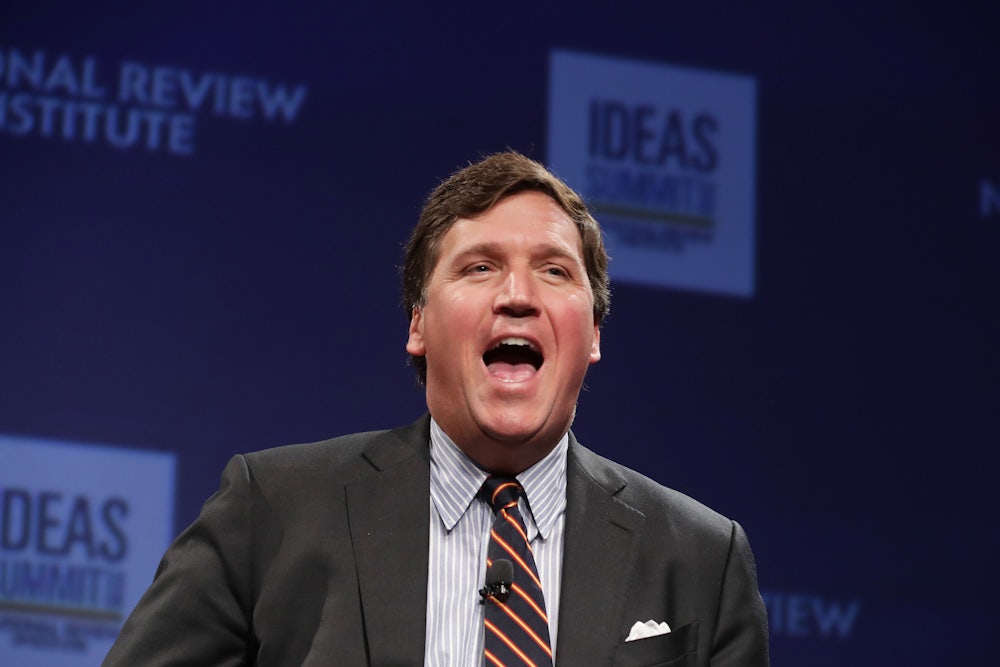Fox News’s Tucker Carlson, America’s least charismatic white supremacist, has apologized for covering the ongoing impeachment hearings, which he has deemed “tiresome,” “dumb,” and “boring.” As he declared in one recent broadcast:
I’d like to open this evening with a breathless update on how some obscure diplomat you’ve never heard of said something forgettable to an even more obscure Ukrainian government official about a topic that has literally nothing to do with your life or the future of our country. Then we are going to drone on about this non-story for the entire hour tonight, and every night this week, hoping that by sheer volume and repetition, we can give it the illusion of relevance. Hope you find it edifying.
Carlson then devoted the rest of the show to the “real news,” which in his case typically means stoking racial panic in his white, elderly audience.
This smug routine is a savvier, more disciplined version of Donald Trump’s own message: The ongoing Ukraine scandal is a nothingburger, a story cooked up by a crooked political and media establishment obsessed with taking down a legitimately elected president.
But over the last week, Carlson’s tone has shifted from hand-waving the impeachment hearings to defending the president’s conduct. Two days before Thanksgiving, he asked, “Why do I care what’s going on in the conflict between Ukraine and Russia? And I’m serious—like, why do I care? And why shouldn’t I root for Russia? Which I am.”
He ended the broadcast by walking back his comments, saying, “I’m joking, of course.” But on Monday night he returned to the same subject.
Enraged by Meet the Press host Chuck Todd’s grilling the previous day of Republican Senator John Kennedy, who has defended Trump by spreading conspiracy theories about Ukrainian interference in the 2016 election, Carlson lit into Todd. “The irony, of course, is that Putin, for all his faults, does not hate America as much as many of these people do,” Carlson bleated. “They really dislike our country. And they call other people traitors?” He then made the same point he had “joked” about a week earlier. “Russia is not America’s main enemy, obviously,” Carlson said. “Our main enemy, of course, is China. And the U.S. ought to be in a relationship with Russia aligned against China, to the extent that we can.”
Carlson has cast himself as Trump’s most important intellectual enabler—someone who can spin the straw of the president’s often contradictory, almost always incoherent policy positions into gold. His new take on Ukrainegate is an ambitious attempt to do the same thing. Russia must be enabled to take on China, our primary economic rival: If Ukraine is the cost of forging an anti-China alliance, so be it. “What makes Vladimir Putin worse than, I don’t know, a whole long list of American allies?” Carlson asked, listing Saudi Arabia and the United Arab Emirates as examples of brutish countries the United States is in bed with.
So this appears to be the new line of the Trumpian right: Trump was right to throw America’s Ukrainian allies under the bus, as they served no real geopolitical importance anyway. The quid pro quo is immaterial, part of a larger, necessary shift in strategic thinking. The U.S., moreover, does bad stuff all the time in the name of national interest. What difference does it make if the bad thing, this time, is done in the personal interest of the president?
It’s a version of realpolitik, albeit one tailor-made for the “own the libs” era of conservative thinking: All that really matters is that Democrats lose. Carlson tries to advance a rational foreign policy argument to defend the president, but instead only makes a nihilistic one, sacrificing both Ukraine’s fate and the integrity of American foreign policy (not to mention its elections) at the altar of Vladimir Putin’s friendship.
Carlson, it’s worth adding, also blew up the GOP’s own flimsy defense of Trump. Ever since the whistleblower report of Trump’s phone call with the Ukrainian president was made public, Trump’s defenders have argued not only that he did nothing wrong, but also that his administration has, in fact, been tougher on Russia than the Obama administration. But here, Carlson is parroting Trump’s own true thinking—that Ukraine is altogether insignificant beyond helping him stick it to Joe Biden.
Over the last three months, Trump’s defenders have continuously moved the goalposts. First, they denied that there was a quid pro quo. When it became clear that there was, they argued that it didn’t really matter. People like Carlson and Lindsey Graham loudly ignored the impeachment hearings, arguing that they were a witch hunt cooked up by the president’s enemies. Now we’ve reached the crude end of the right’s Trumpian logic. Carlson has begun defending Trump’s quid pro quo on its “merits,” arguing that it was in America’s strategic interest. He won’t be the last.
